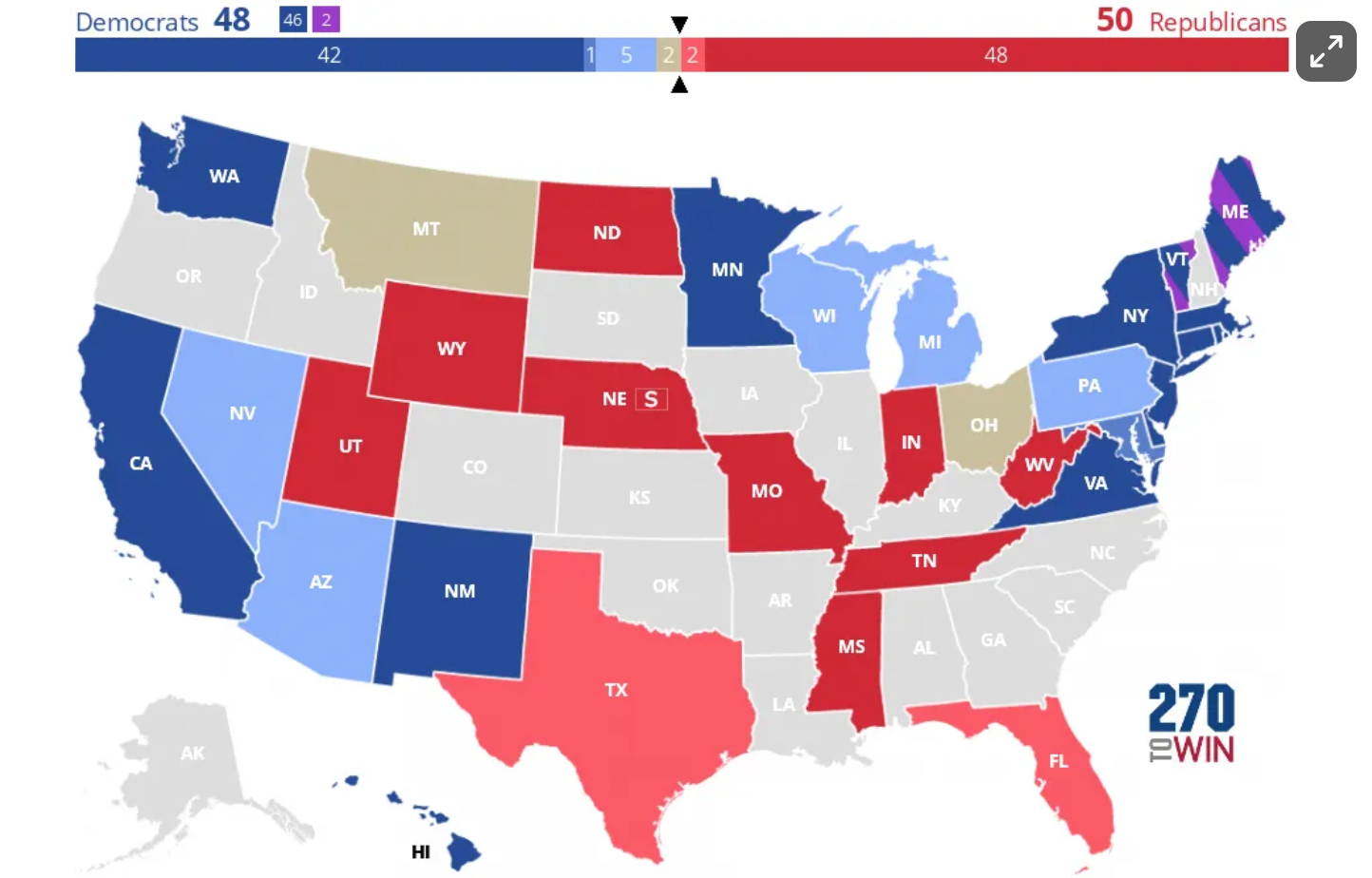
September 12, 2024
Battleground 2024 Senate Races: AZ, MI, MT, NV, OH, PA, WV, and WI
GOP targets 8 swing states to win back the U.S. Senate: Kari Lake (AZ), Mike Rogers (MI), Tim Sheehy (MT), Sam Brown (NV), Bernie Moreno (OH), David McCormick (PA), Jim Justice (WV), Eric Hovde (WI).
Battleground Senate Races in 2024
The Trump-Harris election is neck and neck. (Although, it would most likely be a comfortable Trump win if it were not for ‘election irregularity’ issues.)
Democrats, fearing President Trump may win the White House this November, are determined to keep Democratic Party control of the Senate, but they have an uphill battle in 2024.
There are eight battleground Senate seats the Republican Party has targeted for pick-ups this election cycle. The GOP candidates are Kari Lake in Arizona, Mike Rogers in Michigan, Tim Sheehy in Montana, Sam Brown in Nevada, Bernie Moreno in Ohio, David McCormick in Pennsylvania, Jim Justice in West Virginia, and Eric Hovde in Wisconsin.
Democrats currently hold only a slim 51-49 majority in the U.S. Senate (including the four Independents who caucus with the Democrats). In West Virginia, both Republicans and Democrats acknowledge Republican Gov. Jim Justice will win the open seat (Joe Manchin is retiring) against nominal Democrat opponent Glenn Elliott, which means that the Senate election forecast starts with a 50/50 split Senate map.
After West Virginia, the next most likely Republican Senate pick-up seat is defeating incumbent Sen. John Tester in Montana with Republican nominee Tim Sheehy, a former Navy Seal. While some grassroots activists were disappointed that Sen. Steve Daines and the D.C. uni-party Republicans promoted Sheehy over Rep. Matt Rosendale, any inclination by conservatives not to support Sheehy this election should be immediately dismissed. Republican majority control of the U.S. Senate and House are critical in the next Congress in the fight to preserve our freedoms.
It should be noted that while many America First candidates lost their primaries against more moderate Republican candidates, even a less gutsy Republican serving in Congress who contributes to a Republican majority is better than Democratic Party control of either chamber.
The most vulnerable Senate seats on the ballot this November are all currently held by Democrats or Independents. That’s the good news. Nevertheless, while this year bodes well for Republican pick-ups, in the next two election cycles, a lot more Republican Senate seats will be at risk. Therefore, if Republicans are going to maintain their anticipated new majority status in the Senate after 2026, it is important for Republicans to score as many victories this cycle as possible to build a buffer.
One major factor complicating the elections are the abortion amendments on the ballots this cycle. Almost all of them are designed to loosen abortion laws and enshrine the right to an abortion in state constitutions. These ballot measures are being promoted to increase voter turnout among low propensity Democratic voters who might otherwise not bother to show up to vote for Kamala Harris.
Which are the pick-up Senate races targeted by Republicans?
This map shows Republicans with 50 Senate seats (including West Virginia), and with Montana and Ohio (toss-up beige) most likely to flip to the Republicans.
Arizona: (Open Seat) Kari Lake (R) facing Congressman Rubin Gallegos (D)
Abortion ballot issues: Arizona Proposition 139
Michigan: (Open Seat) former U.S. Rep Mike Rogers (R) challenging incumbent Elissa Slotkin (D)
Montana: Matt Sheehy (R) facing incumbent Sen. John Tester (D)
Abortion ballot issue: Montana Constitutional Initiative 128, Right to Abortion Initiative
Nevada: Sam Brown (R) challenging incumbent Sen. Jacky Rosen (D)
Abortion ballot issue: Nevada Question 6, Right to Abortion Initiative
Ohio: Bernie Moreno (R) challenging incumbent Sen. Sherrod Brown (D)
Abortion ballot issue: an abortion ballot issue previously passed in the Ohio primary.
Pennsylvania: David McCormick (R) challenging incumbent Sen. Bob Casey, Jr. (D)
West Virginia: (Open Seat) Gov. Jim Justice (R) facing Glenn Elliott (D)
Wisconsin: Eric Hovde (R) challenging incumbent Sen. Tammy Baldwin (D)
What Republican Senate seats are the Democrats targeting?
The two most obvious Senate pick-ups for Democrats are Texas and Florida.
Texas: While many liberals were hoping to defeat Sen. Ted Cruz this year, Cruz is less vulnerable than expected thanks to a Republican voter registration surge, a positive shift in demographic trends, and election integrity efforts such as those by Texas A.G. Ken Paxton). Texas (with 40 Electoral College votes—second only to California!), will always be a battleground state, so Texans can never be complacent. But defeating Ted Cruz this year will not be as easy as Democrats once hoped.
Florida: The Democrats need a pickup somewhere since they fully expect to lose a Senate seat in West Virginia. With Cruz looking more secure in Texas, Florida Senator Rick Scott—who only narrowly won in 2018—is facing a more significant threat than originally anticipated. Scott is running against a Hispanic female, Debbie Muscarel-Powell. There are multiple referendums on the Florida state ballot, including an abortion referendum expected to draw liberal women to the polls. The Florida pro-life, pro-family movement is also well-organized to fight Florida Amendment 4, which would not only allow abortions up until birth but eliminate Florida’s parental consent law and the requirement that only licensed doctors can perform abortions. Support for Amendment 4 drops when voters are informed of the full effect of the proposed changes. The strength of the opposition to Amendment 4 can perhaps be assessed by how quickly President Trump, a Florida voter, reversed his position on Amendment 4 from a ‘yes’ to a ‘no’ vote.
California: Not on anyone’s Senate flip list is California, where Steve Garvey, who ran such a strong primary, continues his campaign as the Republican Senate nominee. Garvey’s personal appeal, conservative messaging, and hard charging campaigning, combined with a strong Trump/RFK showing, could produce some significant down- ballot Republican victories.
Minnesota: Another Senate race not on the GOP flip list is Minnesota where the Republican nominee is former NBA basketball star and MAGA podcast host Royce White. A recent poll shows that in the last month White has gained 8 points on Klobuchar. Is this poll a fluke or a trend? White’s message includes focusing on disenfranchised voters in the Twin Cities Metro where White tells black voters to quit trusting big government which promotes endless wars and global citizenship. The stronger White runs, the better for Trump at the top and down ballot GOP candidates.
All of these Senate campaigns can use help from volunteers, especially with door-to-door campaign literature drops and phone banking. Volunteers can either make calls from local Republican headquarters or from their own home. Working with pro life organizations to defeat the radical, pro abortion ballot issues is also an effective way to help Republican Senate candidates.
Remember, Do Not Vote Early. Vote on Election Day!


“Then conquer we must, when our cause it is just,
And this be our motto: ‘In God is our trust.’
And the star-spangled banner in triumph shall wave
O’er the land of the free and the home of the brave.”
-Star Spangled Banner
Share this newsletter with all your like-minded friends and family.
For more information on election integrity please go to:
Defending the Republic PAC News
Section for the latest news on contested elections.

Defending the Republic PAC
Amplify Your Voice
Please Contribute to Defending The Republic PAC so we can Support the Candidates for Office who are Committed to Advancing the Principles of Morality and Freedom which Built our Great Nation.
